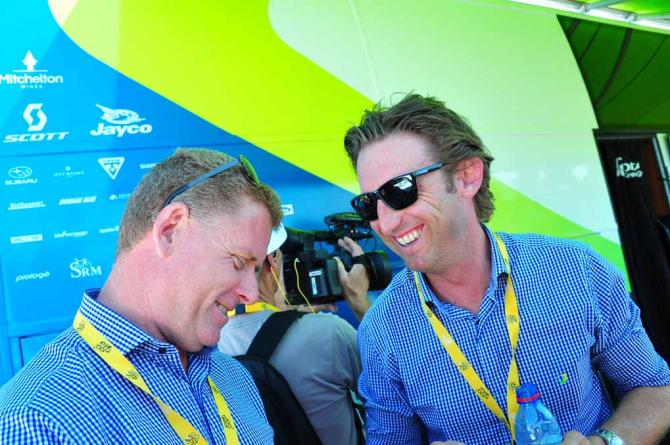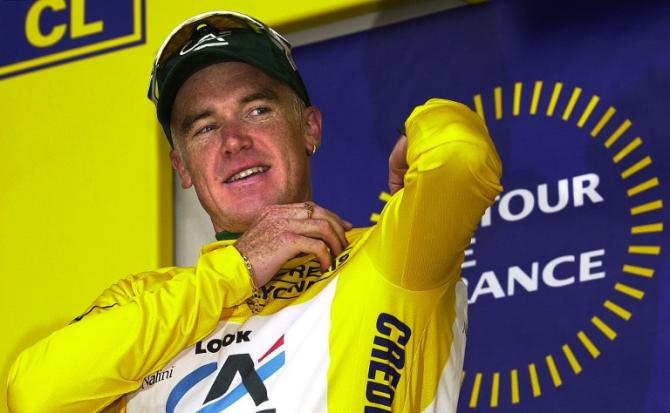White defends Vance report after O'Grady's doping confession
Calls on governing bodies to draw a line


Matt White has defended Nicki Vance's report into the anti-doping policies at Orica-GreenEdge after Stuart O'Grady admitted to taking EPO earlier in his career. The revelation, which came hours after the French Senate announced that the Australian was among a clutch of riders who tested positive during the 1998 Tour, raised questions over the strength of Vance's report which came out in June of this year.
"In her report she even states that under the current climate there's no groundwork laid by the UCI or anyone else to tell truth. At the end of the day people saw how I was treated, especially in the Australian media after telling the truth. Obviously people went to ground and they've been lying for a long time and they felt that they needed to continue to lie because no one was offering them a pathway to come forward to tell the truth. That still hasn't occurred, has it?"
White was forced to step down from his role at GreenEdge last year after he was named in USADA's report into doping at US Postal. He also lost his job with Cycling Australia and was handed a six month suspension. He said he cooperated fully with Australian anti-doping authorities and also with Vance, served his suspension and was re-instated in his role at Orica-GreenEdge under one year probation.
Despite the initial acceptance of Vance's report and her recommendations, O'Grady's confession suggests that her remit was perhaps limited. However White suggests that the sport's governing bodies should have done more to support riders.
"You can only ask people to tell the truth. Vance is not the FBI, she has no investigative powers and she's not a police force. We can't control whether people divulge their whole life histories and no one can," White said.
O'Grady's confession, that he took EPO only in the build to the 1998 TDF before refusing to cheat again, has yet to be scrutinised fully by the Australian media. Perhaps they'll take a more understanding approach after White confessed last year, breaking the seal on a generation of athletes that were proven to be no better and no worse than their European counterparts at the time.
"He's achieved a lot in his career and the vast, vast majority of it clean, but people aren't always putting things into perspective how doping existed in the 1990s and early 2000s and where the sport is now. In 1998, the vast majority of people at the Tour were doped, and that's a fact. Anyone who says otherwise is flat out lying," White said, describing the landscape of the professional scene in the 1990s.
Get The Leadout Newsletter
The latest race content, interviews, features, reviews and expert buying guides, direct to your inbox!
The revelations, or rather confirmations, from the 1998 Tour have created few ruptures. At the moment of writing two riders have lost their current jobs but the release of the list of names has overshadowed the Senate's recommendations on how to fight doping and the news that both WADA and the UCI have agreed to consider them.
For White some of that is too little, too late.
"That's where the UCI are making a massive, massive mistake. They've had years to draw a line in the sand here and nothing that's coming out now is new. We had a dark history in the sport but it has moved on so the names from 1998 mean nothing, apart from being a warning to young athletes about retrospective testing. But these names are so random because almost the whole field was doping in 1998. If you want the truth, that's the truth. That was an era that existed but the sport has moved on."
The idea of the truth and reconciliation – a rather unsavoury use of term given its true application in South Africa - has been bounded around for several months within the sport. It has yet to materialise, with mandates, leadership contents and whimsical musings over power data running through the centrifuges of the sport. The UCI and WADA have both stalled on the concepts; although the latter has always refrained from becoming too entangled in cycling's current malaise.
White believes that it's the UCI who must bring the platform to life.
"They're capable, it's whether they want to," he said.
"They had a couple of years to create a framework since the USADA investigation started and they've called for working groups, one in particular I have been part of but where has it all gone? No one is blaming the UCI for everything that's happened since 1998 and since then in fact out of all the international federations in world sport they've done more than any other to combat doping.
"Anyone who tries to argue differently isn't doing their research but you've got to recognise that the sport had a past and you can't pretend that it didn't happen. That's what it seems like people are trying to do. That and just blaming certain people. It's just ridiculous and until a line is drawn in the sand the negative publicity will keep coming.
"There was an era of cycling that wasn't good. That era is finished and while I'm not saying the sport is 100 percent clean – what sport can guarantee that - but there's been a gradual change in the last seven or eight years and we're in a much better position than most other sports. There's still a lot of work to do but that takes money. At the moment, though, all [Pat] McQuaid and [Brian] Cookson are interested in is who is going to be the next President. We need to deal with the past first."
Daniel Benson was the Editor in Chief at Cyclingnews.com between 2008 and 2022. Based in the UK, he joined the Cyclingnews team in 2008 as the site's first UK-based Managing Editor. In that time, he reported on over a dozen editions of the Tour de France, several World Championships, the Tour Down Under, Spring Classics, and the London 2012 Olympic Games. With the help of the excellent editorial team, he ran the coverage on Cyclingnews and has interviewed leading figures in the sport including UCI Presidents and Tour de France winners.
